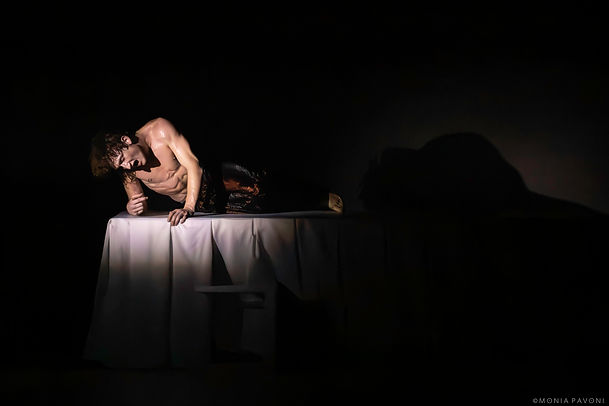
STRANGERS
IN THE NIGHT
by Jos Baker, Linus Jansner, Carlo Massari
The old world is dying.
The new one is slow to appear.
And in this chiaroscuro monsters are born.
Antonio Gramsci


Initially sparked by suggestions drawn from Franz Kafka’s The Metamorphosis, the creative process of Strangers in the Night gradually moved away from its literary reference, evolving into an autonomous dramaturgy shaped by more decisive influences: Freudian psychoanalysis, with its probing of the unconscious and mechanisms of repression; Brecht’s epic theatre, with its critical, distanced gaze on social reality; Beckett’s absurd, which transforms emptiness and waiting into existential experience; and Gondry’s dreamlike, surreal visions, capable of merging poetry with visual estrangement.
From these matrices emerges a performance that questions the very nature of theatre itself: metatheatre becomes a tool for inquiry and unmasking, the boundary between stage and reality fractures, fiction reveals itself as a space of power and manipulation.
The body on stage is a living, unstable language: it twists, breaks, multiplies into contradictory roles, exposing inner tensions that echo the repressed, defensive, and instinctual forces of a divided psyche. Words do not explain, but disrupt; gestures do not decorate, but reveal.
Personal traumas, lies, gaslighting, and mechanisms of self-construction appear not as abstract concepts, but as enacted dynamics: confessions that contradict themselves, moments of intimacy that turn into cruelty, irony suddenly collapsing into tragedy. The performance is structured in tableaux that blend different performative languages, leaving the spectator with the sense of a constantly precarious balance—fragile, on the verge of collapse.
Dreamlike yet politically charged, Strangers in the Night fuses social realism with tragicomic writing, rejecting both pathos and aesthetic self-indulgence. Through sharp irony, sudden tonal shifts, and direct incursions into the audience, the piece becomes a ruthless yet fascinating game.
Its compositional poetics chooses the language of defeat in order to speak of hope: every fall opens onto the possibility of rebirth, every decay carries within it the promise of transformation. The spectator’s experience takes place in this unstable space of constant reversals, where violence coexists with irony, vulnerability with cruelty, reality with its representation.
Strangers in the Night is thus an inquiry into the chiaroscuro of contemporary existence, into the impossibility of fully distinguishing truth from fiction, and into the power of performative art to inhabit that ambiguous space and transform it into a collective experience.


Co-created and performed by Jos Baker, Linus Jansner, Carlo Massari
An idea by Carlo Massari
Script by Jos Baker
In collaboration with Martina La Ragione, Chiara Osella
Music and sound composition Andreas Moulin
Tech direction Francesco Massari
Costume design Chiara Defant
A project by Carlo Massari/C&C Company
A production by C&C Company / SPaCCa
In co-production with Oriente Occidente, Fondazione Nazionale della Danza ATER Balletto, Transart Festival
Supported by ERT Emilia Romagna Teatro Fondazione / Teatro Nazionale – focus CARNE
With the contribution of Assessorato alla Cultura - Regione Emilia Romagna e MIC - Ministero della Cultura
Lenght 60'





